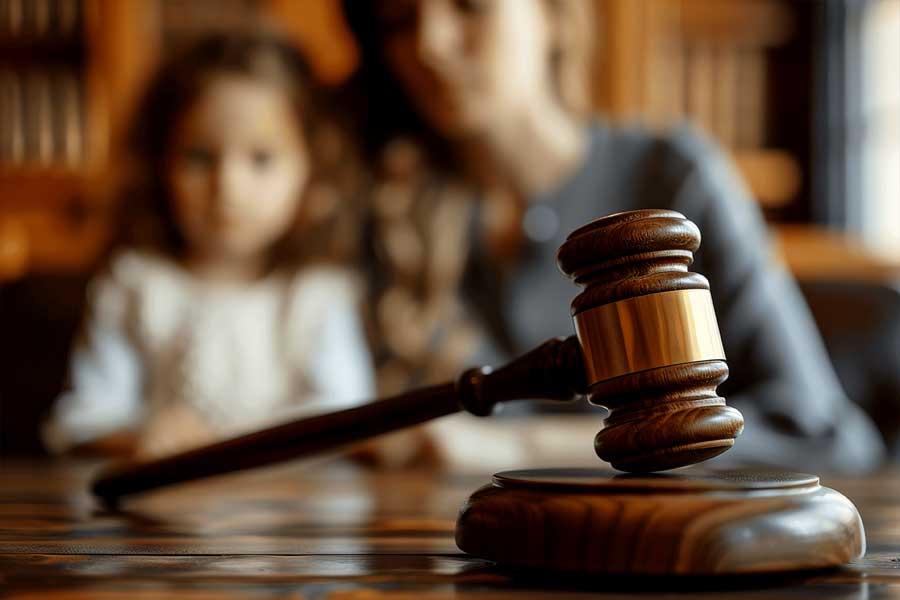Simultaneously facing criminal charges (such as DUI or domestic violence) and a child custody case in Colorado can lead to serious legal consequences, often affecting parental responsibilities even before any criminal conviction.
Colorado’s Custody Standard: Best Interests & Domestic Violence
Under C.R.S. § 14‑10‑124, courts must make decisions about custody—called “parental responsibilities” in Colorado—based on the best interests of the child. The statute explicitly requires courts to consider evidence of domestic violence, child abuse, and coercive control as central factors.
Section 14‑10‑124(1.3)(a) defines coercive control as a pattern of behavior used to threaten, intimidate, isolate, or dominate another person, even without physical harm.
Criminal Allegations and Protective Orders Can Trigger Custody Changes
Even when no conviction has occurred, the existence of a criminal charge or civil protection order can affect parental rights. A family court may restrict or supervise parenting time based on evidence such as police reports, witness statements, or judicial findings that suggest potential harm to a child or the other parent.
Colorado courts may issue protection orders under C.R.S. § 13‑14‑106, including temporary or permanent orders that limit contact with the other parent or children.
Legal Basis for Suspending or Modifying Parenting Time
Under C.R.S. § 14‑10‑129(3)(b), if a parent has been convicted of an act of domestic violence, the other parent may file an objection to continued parenting time. If the responding parent fails to reply within 21 days, parenting time may be automatically suspended. If they do respond, the court evaluates risks and may impose restrictions.
Courts may temporarily or permanently limit parenting time when credible evidence suggests that a child’s safety or emotional development would be endangered. Any such restrictions must be justified with specific factual findings in the court’s written order.
Expanded Court Training & Evaluator Standards Under HB 24‑1350
In 2024, the Colorado General Assembly passed House Bill 24‑1350, which mandates new training requirements for court-appointed evaluators and judicial officers. The law strengthens consideration of coercive control and nonphysical abuse in custody cases and reinforces the importance of expert testimony in such evaluations. The full text of the bill is available from the Colorado General Assembly.
Family Court Evaluations and Child Representation
When custody is contested and allegations of abuse or neglect are raised, the court may appoint a legal representative for the child under C.R.S. § 14‑10‑116. This individual acts solely in the child’s best interests and must be trained in the effects of domestic violence and child abuse, in accordance with state law.
Timeline: How Criminal Proceedings Affect Custody Cases
The intersection of criminal and family law in Colorado often unfolds in stages:
- At the time of arrest or protective order: Family courts may impose immediate restrictions or order supervised visitation.
- While charges are pending: Courts may delay final custody decisions or continue restrictions to prevent potential harm.
- Following conviction: Custody or parenting time may be suspended, modified, or made conditional on rehabilitation or treatment.
- Even if charges are dismissed: Courts may continue restrictions based on independent findings from family court evidence.
For instance, if a parent is arrested on suspicion of domestic violence, a civil protection order may be issued, barring contact with the co-parent and children. In response, the family court may:
- Suspend regular parenting time and order supervised visitation.
- Require neutral third parties or visitation centers for child exchanges.
- Retain modified custody arrangements until further findings show the child is no longer at risk.
Even if the charges are dropped, the family court may maintain those restrictions based on its own review of evidence under the best interests standard.
Key Takeaways
- Criminal charges—especially those involving domestic violence or abuse—can significantly affect custody rights, even without a conviction.
- Colorado law empowers family courts to act swiftly to protect children’s safety using independent standards of evidence.
- Protection orders and parenting time suspensions are governed by clear statutory procedures.
- Legal representation for the child and enhanced evaluator standards aim to ensure decisions are grounded in a full understanding of abuse dynamics.
If you are facing a custody dispute that overlaps with criminal allegations, such as domestic violence, DUI, or protective orders, it’s important to work with an attorney who understands how the family and criminal courts in Colorado interact. These cases often require strategic navigation of both legal systems, where timelines, evidence, and procedural rules can differ significantly. Attorney Brian Boal, a former prosecutor and the founder of Boal Law Firm, brings over a decade of experience handling both family law and criminal defense matters in Colorado Springs. His dual background provides a comprehensive perspective for clients managing these complex, high-stakes legal challenges.

